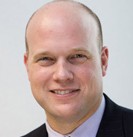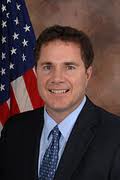
by | May 8, 2013
 (The following is a guest piece from Polk County GOP Co-Chair Chad Brown)
(The following is a guest piece from Polk County GOP Co-Chair Chad Brown)
The political season in Iowa never ends, and the county leadership of Iowa’s 3rd Congressional District is on the move to organize. The harder we work to organize the counties, both Iowa’s 3rd Congressional District and RPI will grow in strength. Some of my activist friends have wanted an explanation of the District Executive Committees, so I wrote this explanation to detail their role.
District Executive Committees have traditionally been a vital ingredient to the success of the Republican Party in Iowa. Their important role is detailed in the RPI Constitution. Traditionally, the Republican Party is built as a grass roots Party that was always strong because it had a firm foundation and was built from the ground up. Unfortunately, the District Executive Committees were deactivated within recent years and that vacuum was filled by powerful single issue groups that dominated the leadership selection process by preventing Republican County leaders from talking to each other and promoting leadership from the grass roots. We want to restore the grass roots to the Republican Party and include more people. This is why people used to refer to the G.O.P. as The Big Tent.
It’s unfortunate that these long-standing Committees were deactivated and silenced, but the new counties’ executive leadership in the 3rd Congressional District are getting back to basics! We are here to improve and unify the Republican Party and get more people involved. The executive leadership of the county-level central committees of the Republican Party of Iowa located within the Third Federal Congressional District of the State of Iowa have called for its first official meeting to be held on May 7 to discuss and consider certain specific matters.
This is an exciting time as we begin to restore an important tradition of grass roots to the Republican Party in Iowa.
Chad Brown, Polk County GOP Co-Chair and 3rd Congressional District Executive Committee ————————————————————————————————-
Article VII, paragraph 1 of the RPI Constitution states:
Article VII District Executive Committees
1. The District Executive Committee shall consist of the Chair and Co-Chair of each County in the Congressional District plus one additional representative for every fifty thousand (50,000) population in that County based on the most recent federal census. The additional County representative sh…all be elected by the County Central Committee.
2. The District Committee shall: (1) direct and coordinate Republican activities in the district, including organizational, candidate recruitment, and finance efforts; (2) coordinate the congressional and legislative campaigns in the district for the duly selected Republican nominees; (3) perform all of the duties relating to any election to fill a district vacancy on the Republican State Central Committee; (4) advise the congressional district’s representatives on the Republican State Central Committee; and (5) do all other things which serve to promote the welfare of the Republican Party and the orderly and successful conduct of the election campaign in the congressional district.

by Art Smith | May 6, 2013
 Former US Attorney Matt Whitaker announced today that he intends to be a candidate for the US Senate seat being vacated by Senator Tom Harkin (D-Iowa), and will make the official announcement on June 3. Â He made the announcement today on WHO Radio’s Simon Conway show.
Former US Attorney Matt Whitaker announced today that he intends to be a candidate for the US Senate seat being vacated by Senator Tom Harkin (D-Iowa), and will make the official announcement on June 3. Â He made the announcement today on WHO Radio’s Simon Conway show.
Whitaker is currently the managing partner at Whitaker Hagenow Gustoff LLP.  He served as the United States Attorney for the Southern District of Iowa from 2004 to 2009, and previously worked for two other law firms and SUPERVALU as corporate counsel.  in 1998, Whitaker graduated from the University of Iowa College of Law and also earned his MBA there.
Matt Whitaker is the first Republican to announce an intention to run for the seat currently held by Harkin. Â Bruce Braley, a Democratic Congressman, has also indicated he will run for the open Senate seat. Â It is expected now that Representative Steve King has declined to run, several other Republican candidates will step forward.
Senator Harkin has been in the US Senate for 28 years, and when he retires will have spent 40 years in Washington DC as a Congressman and Senator. Â Republican opponents to Harkin in 5 US Senate elections have averaged a 12.2 point loss, with the closest to winning being Jim Lightfoot in 1996 (5 points) and the farthest being Chris Reed in 2008 (26 points). Â Tom Harkin has always come across as likable and reasonable to the public, and has always had a substantial war chest when campaigning. Â Running against anyone but Tom Harkin will likely be considered a relief by Republicans in this election.

by | May 4, 2013
 From this point forward the Republican quest to replace Tom Harkin just got more interesting. With King removed from the picture the next batch of announcements we get will be declarations and not withdrawals.
From this point forward the Republican quest to replace Tom Harkin just got more interesting. With King removed from the picture the next batch of announcements we get will be declarations and not withdrawals.
I was never one to think Republicans needed King in the race to win the seat, and in fact have been lukewarm on his chances. I truly believe that a relative newcomer on the scene has a better shot at shoring up the base while still pulling a majority of Independents–which in turn will bring victory.
Prediction wise, don’t be surprised if the list of candidates who decide to run is very, very short. I would not be shocked if only 2 names of the 6 or so being thrown around run in the end…and I swear don’t rule out Bob Vander Plaats.
Below is Steve King’s full statement:
Dear Friends,
I want to thank all of my friends, family, advisors and supporters who have put so much time, thought, prayer, and effort into helping me make a decision on whether to run for the United States Senate. I sincerely thank every potential candidate, all of whom graciously gave me room to decide. Probably no one in America, considering such an opportunity, enjoys as clear a path to the nomination. It is an extraordinary opportunity that will not be repeated in millions of lifetimes.
I have said from the beginning this decision requires “the head, the gut, and the heart†to line up together. I have done due diligence and evaluated the race from a statewide, objective perspective. I have talked with hundreds of supporters…and some detractors. I sincerely thank all of you who have helped in so many ways.
My analytical part, the head, tells me the race is winnable and must be won in 2014 or a generational opportunity could be lost. I have said a race for the Senate is “a slight up hill battleâ€. It is, but it’s “no hill for a climberâ€.
The question I am answering today is, “What is my duty?†I believe my duty is to utilize the honor of serving Iowans in Congress by maximizing my effectiveness. I owe it to all Iowans and Americans to give you my best effort and best judgment.
We have in front of us in Congress a series of potent issues which will redirect the destiny of our state and nation. Among them are a farm bill, ObamaCare, debt and deficit, immigration, and tax reform. If I step away from these responsibilities while campaigning in an effort to multiply leverage in the Senate, what becomes of our nation in the mean time?
This week, I made a simple device to put toothpaste back in the tube. But a device to put the Leftist genie back in the bottle is not so simple. The best tool we have now is the majority in the U.S. House which functions mostly to keep the Leftist genie in the bottle. I cannot, in good conscience, turn my back on the destiny decisions of Congress today in order to direct all my efforts to a Senate race for next year, while hoping to gain the leverage to put the genie back in the bottle in 2015.
The most timely and conclusive piece of advice I received crystallized my decision. A friend, whose 77th birthday is today, said to me, “I will support you whatever you decide to do. If you decide to run, don’t be a reluctant candidate.†If I said, “Yes†to a Senate race, I would be a reluctant candidate because of the reasons I’ve written above.
Accordingly, I will not be a candidate for the United States Senate in 2014. It is my intention to turn my efforts and energy with great vigor to the issues at hand. I anticipate being on the ballot for reelection to the U.S. House, Fourth District of Iowa. It is a challenging and rewarding job that I enjoy. My sincerest thanks to all involved.

by | Apr 10, 2013
 Though it will fall short of the intense attention we receive during Presidential years, November 2014 in Iowa will develop into a fierce battleground for both political parties. In spite of the gubernatorial election on the ballot the prize for each side will be the open US Senate seat vacated by Tom Harkin.
Though it will fall short of the intense attention we receive during Presidential years, November 2014 in Iowa will develop into a fierce battleground for both political parties. In spite of the gubernatorial election on the ballot the prize for each side will be the open US Senate seat vacated by Tom Harkin.
While it is a virtual certainty that Bruce Braley will be the Democrat candidate in this race the Republican field is wide open, with no one yet confirming a run. As it stands now Rep. Steve King has been given the “first right of refusal†by fellow potential candidates Kim Reynolds and Bill Northey, and it is widely believed he will have decided by May 1st. One way or another, the field will become clear soon after. In the meantime, here is a first look at the dynamics if the matchup were King vs. Braley.
The Numbers
On last weekend’s Iowa Press Steve King referred to a Republican winning the seat as a “slightly uphill battleâ€â€”and the numbers indeed bear this out. Though they were highly inflated due to it being a Presidential election year, the cumulative votes cast last year in Iowa’s four Congressional districts reveal the Republican will be starting in an electoral hole. In total the four Congressional Democratic candidates (Braley, Loebsack, Boswell, and Vilsack) received 772,387 votes, while the four Republican candidates (Lange, Archer, Latham, and King) received 726,505 votes (D+45,882).
Obviously this is too broad a measure to be definitive but it does give a feel for the obstacles the Republican will face. Far more informative is looking at how Braley and King faired in their individual races. In this scenario the candidate and the electorate in their districts remain the same and the only variable that changes is the opponent. What the numbers show is that Bruce Braley is a better performing candidate than Steve King—something that will likely come as a surprise to many Republicans.
Last cycle Braley went in with a 25,420 voter registration advantage in HD 1 over Ben Lange but won by 59,957—beating the numbers by 34,537. Meanwhile King went in with a 50,396 voter registration advantage in HD 4 over Christie Vilsack but won by only 30,593 votes—losing the numbers by 19,803.
Yes Braley and Vilsack’s numbers were surely inflated due to Obama being on the ballot, and King and Lange were done no favors by Romney’s trouble with Independents, but there is still cause for concern. This is due to the fact that some of this inflated total was surely offset by King facing a far weaker opponent than Braley—Lange was a proven campaigner who came within 4,000 votes of beating Braley in 2010 while Vilsack proved to be an awful candidate who ran a terrible campaign.
These facts are certainly not to suggest a Republican cannot win the seat, they merely offer some context on the difficulties involved and likely explain the caution potential candidates are proceeding with.
Braley vs. King on Paper
The perplexing thing about this potential matchup is that on paper King is a far superior candidate to Braley. While King started an earth moving construction company from scratch, Braley is a trial lawyer and former head of the Iowa Trial Lawyers Association. Though it is true King has a visceral way of approaching issues and a knack for the ill-worded statement, Braley’s voting record reveals he is without a doubt a west-coast Liberal who just happens to reside in Iowa. In fact, besides voting with Democrats and Obama’s agenda 98% of the time in 2008, 99% in 2009, and 98% in 2010, since January 2007 he has voted 91% of the time with Nancy Pelosi. Among these votes of course are Cap & Trade, Dodd-Frank, Obamacare, and authorizing more than $6 trillion in debt over the last four years.
The number one objective for the campaign of whatever Republican takes on Braley will be getting the word out on his voting record. And if the above facts aren’t enough evidence of his poor decision making for Independents in Iowa—you can add he was one of the first to endorse fellow trial lawyer John Edwards for president in 2008.
My Take
In many Republican circles it has become a common belief that Steve King can’t win a statewide race—I do not concur. Perhaps I’d see more truth in this if the candidate on the other side was a moderate instead of one of the most Liberal politicians in the country—funny how we never hear Bruce Braley can’t win a statewide race.
That being said, I am of the belief that our strongest candidate by a longshot would be Kim Reynolds—and we would not risk a House seat in the process. While he would surely have a shot if he ran, undoubtedly the media would exclusively focus on King’s past statements and ignore Braley’s voting record.
In the end I predict that King will decide against running. Whether he proves me wrong or not, whoever takes up this task will have to run hard. Though this is a realistic opportunity for Republicans the numbers show that it indeed will be a “slightly uphill battleâ€.

by | Mar 18, 2013
 The battle between traditional Republicans and Libertarians that began in Iowa on Caucus night in 2012 has risen to a destructive level and needs to be addressed. If it weren’t so publicly obvious I would call this an opinion—but the reality is it’s a fact.  What has transpired to this point is a lot of bomb throwing from each side and very little, if any, attempts to search for the potential common ground that would result in, at the least, a truce—and perhaps even a mutually beneficial alliance.
The battle between traditional Republicans and Libertarians that began in Iowa on Caucus night in 2012 has risen to a destructive level and needs to be addressed. If it weren’t so publicly obvious I would call this an opinion—but the reality is it’s a fact.  What has transpired to this point is a lot of bomb throwing from each side and very little, if any, attempts to search for the potential common ground that would result in, at the least, a truce—and perhaps even a mutually beneficial alliance.
Some Background
The feud started when, after having a relatively modest presence in 2008, Ron Paul inspired Libertarians organized and made a concerted effort to acquire as many county central committee seats as possible on caucus night. Perhaps surprising even themselves, they encountered very little resistance and were hugely successful in many precincts.
Since that night in June the hostility level has ratcheted up several notches, and I believe both sides share some responsibility in what has become a very non-productive situation. Initially I understood the reaction and the lashing out from Republicans—they were taken by surprise, infiltrated, lost a good deal of influence they had taken for granted, and their tone at first was a reasonable natural response.
On the other side, Libertarians went on to essentially take over RPI and gain a presence at the county leadership level. In the aftermath I feel there was a lack of reaching out to traditional Republicans that could have lessened the wounds, resulted in more unity, and ultimately led to more victories in November. The bottom line is they came up short on election night, and if they thought prior they didn’t need inner-Party cooperation to win House and Senate races they were clearly proven wrong.
What makes this battle so maddening is that each side could have benefited greatly by working together. This was proven by the returns from the Iowa Senate races where only a few hundred more votes would have led to Republicans winning a majority—and thus controlling the Governor’s Office and both Legislative Branches in Iowa. Had this come to pass, both factions would today be much closer to implementing their principles into legislation. At a minimum traffic cameras would be banned, taxes would be lower, and the proposals being debated on education reform would look much different.
Each Side Shares Some Blame
For what it’s worth here is how I see each side’s culpability in this conflict:
Where Traditional Republicans are to blame
• Not enough interest at a grassroots level on caucus night to even fill central committee seats.
• Rhetoric has been too harsh and focused on a small number of political operatives—by extension this has served to alienate libertarian leaning voters who may be persuaded to support the Republican candidate in their district.
• Lack of success in building the Party base and, so far as I know, doing very little youth outreach.
• Especially at the Federal level, the chance was blown to control government expansion and spending throughout the 2000’s.
• Not realizing that Conservative and Tea Party Republicans are now closer on the spectrum to Libertarians than they are to traditional Republicans.
Where Libertarians are to blame
• Not enough reaching out by new leadership after taking over RPI.
• Rhetoric has been too harsh—sending mass e-mails impugning the personal integrity of media members is not the way to conduct yourself.
• Too many rank and file Libertarians in the movement don’t care about winning elections and are uninterested in working to shape the Republican Party—if a Libertarian is not on the ballot they disappear. The all or nothing approach is irrational, and in fact is counter-productive if you hold strong convictions.
• Lack of realistic policy goals—the Federal budget isn’t going to be balanced in a year, nor will we go from marijuana being illegal to all drugs being decriminalized in a 2 year timespan.
• Complete lack of pragmatism from many rank and file in the Libertarian movement. To me the litmus test for this are Libertarians who could not bring themselves to vote for Mitt Romney, even though he was running against a president that was the proven antithesis of everything they claim to stand for. You can say what you want about Romney, and I get the criticisms, but the guy ran on the Paul Ryan budget for heaven sake—no more aggressive approach will ever be championed by a presidential candidate (prior to a total economic collapse that is).
Whether you agree with my specific assessments of blame or not doesn’t really matter. What matters is that both sides start attempting to bridge this divide well before the 2014 elections.
Moving Forward
Personally I don’t have a dog in this increasingly silly fight. What I want is for Conservative principals to be implemented and this can only happen if Democrats are defeated in elections. When it comes to primaries I subscribe to the William F. Buckley philosophy of supporting the most Conservative candidate who can win.
If Conservatives, traditional Republicans, and Libertarians all followed this mantra in both primaries and general elections all would benefit and success would be had. If segments of each faction continue being concerned about what kind of Republican is on a general election ballot (unless there is a specific and compelling reason to withhold support), then Democrats will win. As long as Democrats win society will continue to get more progressive and taxes and spending will rise—it’s just that simple.
Page 3 of 10«12345...10...»Last »

 (The following is a guest piece from Polk County GOP Co-Chair Chad Brown)
(The following is a guest piece from Polk County GOP Co-Chair Chad Brown)






